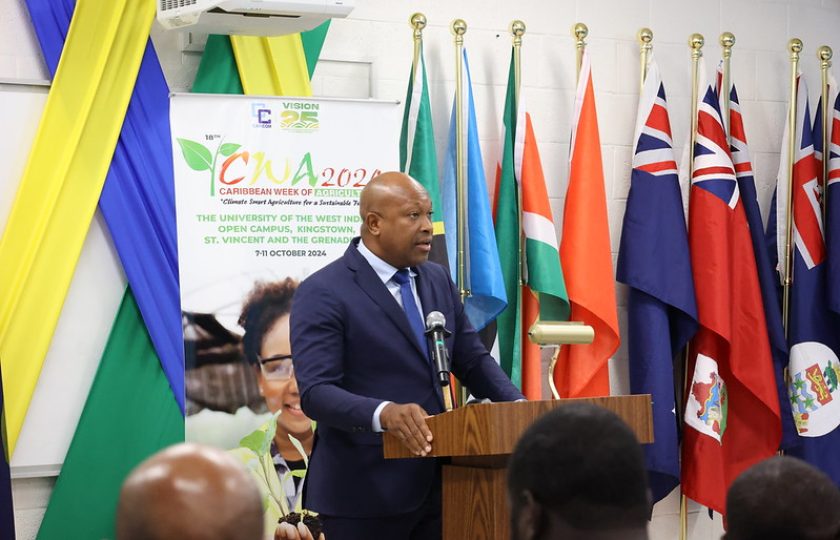
Mr. Brian Bogart
Representative and Country Director
World Food Programme Caribbean Multi-Country Office
As the Caribbean continues to grapple with compound crises – climate shocks, supply chain disruptions, and a rising cost-of-living – efforts must be intensified to make local food systems more resilient. The 2024 Caribbean Food Security and Livelihoods survey tells us that 43 percent, almost half of the region’s population, finds it hard to meet their most basic needs as they face food insecurity. The survey also found that those involved in agriculture continued to report increasing prices for critical inputs like animal feed and fertilizers. For survey respondents engaged in fishing and coastal activities, 79 percent were impacted by high fuel costs.
CARICOM and its partners have made progress to lay the foundation for reducing the amount of food that the region imports. These efforts partially address the risk of reduced access to food when supply chains are disrupted by factors external to the Caribbean. However, Hurricane Beryl’s impact in July was a stark reminder of the region’s vulnerability to nature’s wrath. The category 4 hurricane left a trail of destruction across the region from Barbados to Jamaica where farming and fishing communities have suffered significant losses. The fishing sector is especially vulnerable. On Union Island, in the southern Grenadines, 90 percent of fishing boats were damaged leading to the disruption of the livelihoods of fisherfolk and all of those involved in the fisheries value chain, from dockyards to processors and retailers.
This year’s Caribbean Week of Agriculture happens during what is predicted to be a highly active hurricane season. Hurricane Beryl was the first of an expected 4-7 major hurricanes. Previously, storms have stripped people of their homes and livelihoods in a matter of hours. In the face of such threats, the World Food Programme (WFP) recognizes that there are several initiatives that can help promote the longevity and resiliency of agriculture.
Through support from the United Nations Central Emergency Relief Fund (CERF), WFP and the Food and Agriculture Organisation of the United Nations (FAO) are collaborating to assist fisherfolk from St. Vincent and the Grenadines in the aftermath of Hurricane Beryl. The project provides access to both cash for supporting their immediate needs and resources for fishing to ensure that this group can maintain their livelihood over time. WFP has also supported the farming community in Belize after Hurricane Lisa stripped many of key crops in 2022. Working with the Ministry of Agriculture, Food Security and Enterprise and The Church of Jesus Christ of Latter-Day Saints and the Italian Cooperation, hundreds of smallholder farmers accessed equipment and materials to restart their farming operations.
In addition to expanded emergency response programmes WFP works with governments to enhance national programs that direct food and nutrition assistance to vulnerable groups. Through partnerships with Ministries of Education and other agencies, WFP seeks to support school meals programmes that promote use of locally grown foods. This serves to strengthen the local value chain and provide small scale farmers with guaranteed earning opportunities.
WFP continues to foster strong partnerships in the Caribbean to strengthen food security and social safety nets for the most vulnerable. The WeCan Project in Sant Vincent and the Grenadines is one such initiative. Targeting 300 households who are eligible for national social assistance programmes, the project affords them training in agriculture and business. The project provides a foundation for a brighter future in multiple ways. The trainees develop marketable skills that allows them to take charge of their futures. With increased participation in agri-food system supports national and regional goals to reduce foreign exchange expenditure on food imports. As the region works to change mindsets on careers in agriculture, opportunities like WeCan and the WFP/CARICOM ‘I am agriculture’ campaign demonstrate that agriculture can offer a prosperous future.
When extreme weather events and global disruptions happen, the Caribbean is left to face the music, often with little resources. Looking ahead, WFP is well positioned to support the Caribbean with logistics expertise not only to analyse but also optimize transportation to increase the regional supply chain and logistics. Specifically, WFP can build capacity for effective food systems management and logistics through value chain analysis, route to market assessments, retail market assessments, post-harvest handling and temperature sensitive supply chain management.
Caribbean Week of Agriculture (CWA) 2024, will be a platform for great collaboration. The discussions, which bring together policy makers and producers are a springboard to reinvigorate the drive to achieve vision 25 by 2025 and greater resilience to shocks within food systems. Through our interventions, WFP’s supports innovation and creative approaches to future proof the Caribbean’s food supply chain. WFP’s work to provide assistance during emergencies, strengthen food systems and support the agriculture sector is made possible through support from the Government of Canada, UN Central Emergency Relief Fund, the Church of Jesus Christ of Latter-Day Saints, the European Union, the Italian Cooperation, UK Aid from the UK Government and USAID Bureau of Humanitarian Assistance.

